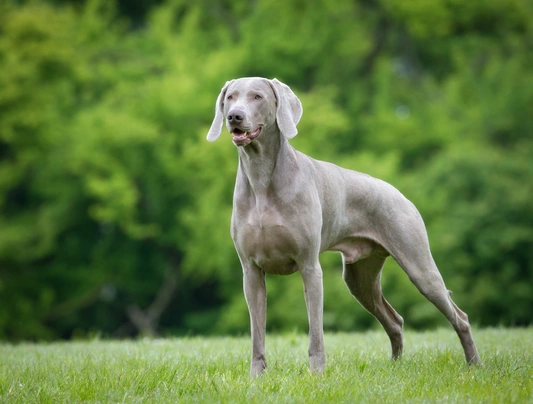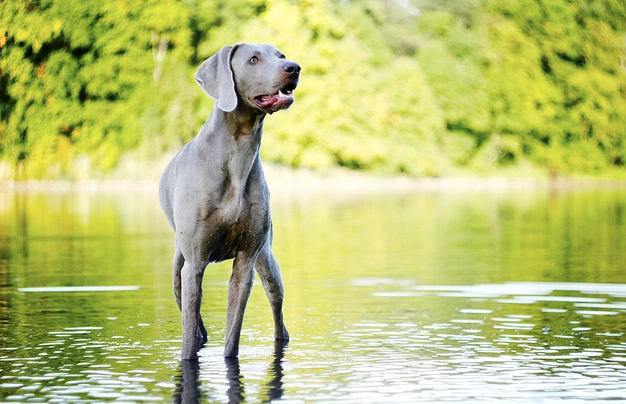Weimaraner
Pros
Cons
Introduction of the Weimaraner
The Weimaraner is a handsome dog with their lovely silvery coats and light coloured eyes. They are native to Germany where they have always been highly prized for their hunting skills and the fact they make such wonderfully loyal family pets. But they are not the best choice for first time dog owners because Weimaraners are highly intelligent and quickly pick up on things including if an owner is not the alpha dog which sees them show a more dominant side to their natures. They are much happier living with people who lead active outdoor lives and who would like a strong canine companion at their side.
Today Weimaraners are often used as assistance dogs throughout the world thanks to the fact that in the right hands and environment they are so intelligent and good natured. Often referred to as Weims these elegant dogs have found their way into the hearts and homes of many people here in the UK and are becoming a big hit in the show ring too thanks to their charming looks and loyal intelligent personalities.
History of the Weimaraner
The history of the Weimaraner remains a bit of a mystery although similar looking dogs are depicted in paintings by Van Dyke that date back to the 1600's. The dogs were bred in Weimar an independent state where they were highly prized for their smart looks intelligence and their hunting skills more especially their ability to hunt point track and retrieve over all sorts of challenging terrains.
There are those who believe the breed could be a relative to the German Short-Haired Pointer and that both breeds share a common ancestry. It is also thought the breed came about by crossing Schweisshund breeds with Bloodhounds.
They take their name from the Grand Duke of Weimar and were once the preferred dog of nobility on the hunting field where they were used to track down large prey. This included wildcats deer mountain lions bears and wolves. However by the 1800's large game became rarer in Germany which led to Weimaraners numbers falling too.
For many years not much was known about their breeding because the Germans kept this a close secret. However in 1937 the first Weim was taken over to America and a few years later in 1943 the breed was recognised by the American Kennel Club. It was not until 1952 that Weimaraners were introduced to the UK by Major Petty who had become a breed enthusiast during the time he served in the army in Germany.
Today they are a popular choice as rescue and assistance dogs for the disabled. In many parts of Europe the Weimaraner is used by the Police and over the years they have proved themselves to be reliable and trustworthy companion dogs and family pets which has helped the breed gain popularity both in the UK and elsewhere in the world.
Interesting facts about the breed
- Is the Weimaraner a vulnerable breed? No they are among the most popular pets in the UK and elsewhere in the world
- Weimaraners remained a German secret right up until the late 1930s
- They have always been highly prized hunt point track and retrieve dogs in their native Germany
- It is thought that the breed could have been around as early as the 16th Century
- Weimaraners have traditionally had their tails docked a practice that has been going on throughout time. The reason spaniel's tails were docked was to prevent them from being damaged when dogs were flushing out and retrieving game in undergrowth. It was only in 1993 that a law was passed preventing anyone other than a vet from carrying out the procedure but this was further changed when The Animal Health and Welfare Act (Scotland) came into effect in 2006 which invoked a total ban on tail docking unless for medical reasons. In other parts of the UK the Animal Welfare Act came into effect in April 2007 which meant that dog's tails could no longer be docked unless they fell into the category of a specific "working" dog or for medical reasons.
Appearance of the Weimaraner
Height at the withers: Males 63 - 68 cm Females 58 - 63 cm
Average weight: Males 32 - 37 kg Females 25 - 32 kg
The Weimaraner is a handsome dog with their silvery coats and striking amber or blue coloured eyes. They are tall and have a proud look about them being the tallest of all gundogs. They move very gracefully showing a good turn of speed when needed. They have quite long proud heads with a moderate stop and a hint of a median line that extends to the back of a dog's forehead. They also have quite a prominent occipital bone. Their flews are rather deep with dogs having a powerful jaw. Noses are grey in colour and their eyes can be either amber or blue depending on the colour of a dog’s coat.
Their eyes are set nicely apart on a dog's face medium in size and a round shape with Weimers always having an alert kind and intelligent look in them. Their ears are long set high being long nicely lobular and have a slight fold in them. The Weimer has a strong jaw with a perfect scissor bite where their upper teeth neatly overlap their lower ones. Their necks are moderately long and clean-cut which adds to their overall elegant appearance. Front legs are strong powerful and straight.
Their chest is deep and well developed with dogs having well sprung ribs that extend nicely to a firm short loin. Their topline is level and croups slope slightly. Weimers have nicely developed abdomens with a moderate amount of tuck up and their brisket falls to a dog's elbow. Back legs are well developed and muscular with dogs having compact firm feet and well arched toes. Pads are thick and well-padded and nails are short being either a grey or amber colour. Their tails are moderately set and quite thick at the root before it tapers to the tip. Dogs carry their tails level to their backs when relaxed but raised when excited or alert.
When it comes to their coat the Weimaraner has a short sleek and smooth coat with the hair on their necks chests and bellies being longer than on the rest of the body. Longer coated Weimaraners have longer coats with the hair on their chests necks and bellies being anything from 2.5 to 5cms long and their tails and backs of their legs are nicely feathered too. The accepted breed colours for registration are as follows:
- Mouse Grey
- Mouse Grey & White Chest Mark
- Roe Grey
- Roe Grey & White Chest Mark
- Silver Grey
- Silver Grey & White Chest Mark
Gait/movement
When a Weimaraner moves they do so effortlessly while covering a tremendous amount of ground when they do. They are well balanced nicely coordinated dogs that when seen from behind their back feet move in a parallel motion to their front ones. When seen from the side a Weimaraner has a strong and level topline when moving.
Faults
The Kennel Club frowns on any sort of exaggerations or departures from the breed standard and would judge any faults on how much they affect a dog’s overall health and wellbeing as well as their ability to perform or work.
Males should have both testicles fully descended into their scrotums and it is worth noting that Weimaraners can be a little shorter or taller as well as slightly lighter or heavier than stated in the KC breed standard which is to be used as guideline only.
Temperament of the Weimaraner
The Weimaraner is an energetic and proud dog and one that boasts huge amount of stamina. They are immensely smart and quickly differentiate between owners they can respect and those they can show a more dominant side to the natures to which is why they are better suited to people who are familiar with their specific needs. They were originally bred for life in the field which in short means it would be hard to over-exercise a mature Weim. They are happiest living with families who lead active outdoor lives and who live in the country or who boast large back gardens.
Weimaraners are often quite highly-strung dogs which in short means they need to be carefully handled and trained from a young age but because they mature quite slowly this needs to be taken into account during their training. In short to successfully train a Weimaraner often takes a lot of time patience and understanding.
Weimaraners form strong bonds with their families becoming totally devoted to their owners which means they are best suited to households where at least one person stays at home when everyone else is out of the house. They are known to follow their owners around the house from room to room so they can be with them. If a Weimaraner spends too much time on their own they are likely to suffer from separation anxiety which can lead to dogs developing all sorts of behavioural issues and this includes being destructive around the house.
They are not a good choice for first time owners because Weimaraners are better suited to people who are familiar with their specific needs and who know how to handle and train what can only be described as a sensitive smart although sometimes highly strung and often demanding dog. They are not the best choice for people who live in apartments either because Weimaraners thrive in being in an outdoor environment as much as possible.
They are known to like water and having webbed feet Weims are remarkably strong swimmers which means care must be taken when walking them off their leads anywhere near more dangerous water courses. They are often wary and aloof around people they don't know preferring to keep their distance until they get to know them.
Are they a good choice for first time owners?
Weimaraners as previously mentioned are not the best choice for first time dog owners because they need to be carefully and gently handled and trained while all the time showing dogs a lot of patience and understanding.
What about prey drive?
Weimaraners were originally bred to hunt point track and retrieve but because they are highly trainable in the right environment and with the correct training a dog can be taught not to chase smaller animals they come across. With this said a badly bred and incorrectly trained Weimaraner would happily take off after smaller animals they see which means great care must be taken as to where and when they can to run free off the lead.
What about playfulness?
Weimaraners are sensitive and sometimes highly-strung dogs but in the right hands they can be relaxed and playful. They learn new things quickly and enjoy playing interactive games with the people they trust and love.
What about adaptability?
Weimaraners are not that adaptable to apartment living doing a whole lot better in homes with large secure back gardens that dogs can safely roam around in whenever possible. They need a tremendous amount of daily physical exercise combined with lots of mental stimulation to be truly happy dogs.
What about separation anxiety?
Because Weimaraners become so devoted to their families they hate it when they find themselves on their own for any length of time which is why they are better suited to people who work from home who lead busy outdoor lives and people who spend as much time in the great outdoors are they can preferring to do so with a loyal canine companion that boasts a tremendous amount of stamina. Dogs that are left alone suffer from separation anxiety which sees them becoming destructive around the home which is their way of relieving their boredom and the stress they are feeling.
What about excessive barking?
Weimaraners are not known to be "barkers" although any dog that's left on their own for too long might show their stress by barking incessantly to get attention. If a puppy or young dog starts to bark for no reason this sort of behaviour must be gently nipped in the bud earlier on being careful not to frighten them bearing in mind that Weimaraners need to be handled carefully so as not to upset them.
Do Weimaraners like water?
Most Weimaraners love swimming and will take to the water whenever they can more especially when the weather is hot. However if anyone who owns a dog that does not like water should never force them to go in because it would just end up scaring them. With this said care should always be taken when walking a Weim off the lead anywhere near more dangerous watercourses just in case a dog decides to leap in and then needs rescuing.
Are Weimaraners good watchdogs?
Weimaraners should not be taught to be guard dogs and it would be a serious mistake to attempt to train a dog to be guard because it would only bring out the worst in them and this includes Weims being aggressive and dominant. With this said a Weim would always let their owner know when there are strangers about or if something they don't like is going on in their environment.
Intelligence / Trainability of the Weimaraner
The Weimaraner is a highly intelligent character that’s known to be "quick-witted" which is why they do better with people who are familiar with this type of extremely smart dog. Their socialisation and training has to start early and it must be consistent throughout a dog's life. Weimaraners need to know their place in the pack and who is the alpha dog in a household. Without the right sort of guidance they may start to show a more dominant side to their nature which is something to be avoided at all costs bearing in mind that these handsome dogs are extremely confident by nature.
In the right hands and environment Weimaraners are easy to train. They thrive on knowing who they can look to for direction and guidance. They are the sort of dog that needs to know what an owner expects of them. They do not respond well to any sort of harsh correction or heavy-handed handling but they do answer extremely well to positive reinforcement training which gets the best out of a Weimaraner because this type of training method brings out their natural talents.
Puppies need to be well socialised from a young age and their education must start early too so that they understand the limits and boundaries set for them. The first commands a puppy should be taught are as follows:
- Come
- Sit
- Stay
- Quiet
- Leave it
- Down
- Bed
Children and other
Weimaraners are known to be good around children and they enjoy playing interactive games with the kids. However they are a better choice in households where the children are older and therefore know how to behave around large dogs bearing in mind that a Weimaraner also needs to be taught that the kids must be respected too. With this said care must be taken when a Weimaraner is around toddlers because they may accidentally knock a smaller child over which could end up scaring or hurting them.
When well socialised from a young enough age Weimaraners generally get on well with other dogs although they can be a little "off" with some dogs. However care has to be taken when they are around smaller animals and pets just in case. If they have grown up with a family cat in the home they usually get on well together but a Weimaraner would think nothing of chasing a cat they don't already know and would take great delight in doing so.
Health of the Weimaraner
The average life expectancy of a Weimaraner is between 11 and 14 years when properly cared for and fed an appropriate good quality diet to suit their ages.
The Weimaraner is known to be a healthy dog and one that suffers from few hereditary health issues. The conditions that seem to affect the breed the most are as follows:
- Dilated cardiomyopathy - a serious condition that negatively impacts a dog's heart muscle
- Districhiasis - a condition where too many eyelashes grow and so so inwards
- Ectropion( Eyelids Roll Outwards )
- Entropion(Eyelids Folding Inwards )
- Epilepsy
- Bloat/gastric dilation - a life threatening condition that needs emergency treatment
- Hip dysplasia - BVA/KC scheme available and all stud dogs should be hip scored before being used for breeding purposes
- Juvenile pyoderma - a skin condition lined to lymphadentis which affects puppies and younger dogs
- Pancreatic insufficiency - a condition that negatively impacts a dog's pancreas
- Mast cell tumours/cancer (MCT)
- Steroid responsive meningitis
- Syringomyelia - a chronic progressive disorder that affects a dog's spinal cord
More about tail docking
Working Weimaraners have traditionally had their tails docked a practice that has been going on throughout time. The reason spaniel's tails were docked was to prevent them from being damaged when dogs were flushing out and retrieving game in undergrowth. It was only in 1993 that a law was passed preventing anyone other than a vet from carrying out the procedure but this was further changed when The Animal Health and Welfare Act (Scotland) came into effect in 2006 which invoked a total ban on tail docking unless for medical reasons.
In other parts of the UK the Animal Welfare Act came into effect in April 2007 which meant that dog's tails could no longer be docked unless they fell into the category of a specific "working" dog or for medical reasons.
What about vaccinations?
Weimaraner puppies would have been given their initial vaccinations before being sold but it is up to their new owners to make sure they have their follow-up shots in a timely manner with the vaccination schedule for puppies being as follows:
- 10 -12 weeks old bearing in mind that a puppy would not have full protection straight away but would be fully protected 2 weeks after they have had their second vaccination
There has been a lot of discussion about the need for dogs to have boosters. As such it's best to talk to a vet before making a final decision on whether a dog should continue to have annual vaccinations which are known as boosters.
What about spaying and neutering?
A lot of vets these days recommend waiting until dogs are slightly older before spaying and neutering them which means they are more mature before undergoing the procedures. As such they advise neutering males and spaying females when they are between the ages of 6 to 9 months old. Other vets recommend spaying and neutering dogs when they are 6 months old but never any earlier unless for medical reasons.
What about obesity problems?
Some Weimaraners gain weight after they have been spayed or neutered and it's important to keep an eye on a dog's waistline just in case they do. If a dog starts to put on weight it's important to adjust their daily calorie intake and to up the amount of exercise they are given. Older Weimaraners too are more prone to gaining weight and again it's essential they be fed and exercised accordingly because obesity can shorten a dog's life by several years. The reason being that it puts a lot of extra strain on a dog's internal organs including the heart.
What about allergies?
Weimaraners are prone to suffering from allergies and more especially a condition known as Juvenile pyoderma which affects puppies and younger dogs. As such it's important for a dog to see a vet sooner rather than later if one flares up. Any form of other type of allergy can be notoriously hard to clear up and finding the triggers can be challenging. With this said a vet would be able to make a dog with an allergy more comfortable while they try to find out the triggers which could include the following:
- Certain foods
- Airborne pollens
- Dust mites
- Environment
- Flea and tick bites
- Chemicals found in everyday household cleaning products
Participating in health schemes
All responsible Weimaraner breeders would ensure that their stud dogs are tested for known hereditary and congenital health issues known to affect the breed by using the following scheme:
What about breed specific breeding restrictions?
Other than the standard breeding restrictions for all Kennel Club registered breeds Weimaraners can either have a smooth coat or a long-haired coat and breeders can choose to register their puppies as being long-haired with the Kennel Club.
What about Assured Breeder Requirements?
It is mandatory for all KC Assured Breeders to use the following scheme on all stud dogs and the Kennel Club strongly advises other breeders to follow suit:
The Kennel Club also recommends that all breeders adhere to the following advice:
- Bitches under two years are not to produce a litter
- Bitches should not produce more than one litter in a 12-month period
Caring for the Weimaraner
As with any other breed Weimaraners need to be groomed on a regular basis to make sure their coats and skin are kept in top condition. They also need to be given regular daily exercise to ensure they remain fit and healthy. On top of this dogs need to be fed good quality food that meets all their nutritional needs throughout their lives.
Caring for an Wiemaraner puppy
Weimaraner puppies are boisterous and full of life which means it's essential for homes and gardens to be puppy-proofed well in advance of their arrival. A responsible breeder would have well socialised their puppies which always leads to more outgoing confident and friendly dogs right from the word go. With this said any puppy is going to feel vulnerable when they leave their mother and littermates which must be taken into account. The longer a puppy can remain with their mother the better although it should never be for too long either.
It's best to arrange to pick puppy up when people in the home are going to be around for the first week or so which is the time needed for a puppy to settle in. Puppy-proofing the home and garden means putting away any tools and other implements that a boisterous puppy might injure themselves on. Electric wires and cables must be put out of their reach because puppies love chewing on things. Toxic plants should be removed from flowerbeds and the home too.
Puppies need to sleep a lot to grow and develop as they should which means setting up a quiet area that's not too out of the way means they can retreat to it when they want to nap and it's important not to disturb them when they are sleeping. It's also a good idea to keep "playtime" nice and calm inside the house and to have a more active "playtime" outside in the garden which means puppies quickly learn to be less boisterous when they are inside.
The documentation a breeder provides for a puppy must have all the details of their worming date and the product used as well as the information relating to their microchip. It is essential for puppies to be wormed again keeping to a schedule which is as follows:
- Puppies should be wormed at 6 months old
- They need to be wormed again when they are 8 months old
- Puppies should be wormed when they are 10 months old
- They need to be wormed when they are 12 months old
Things you'll need for your puppy
There are certain items that new owners need to already have in the home prior to bringing a new puppy home. It's often a good idea to restrict how much space a puppy plays in more especially when you can't keep an eye on what they get up to bearing in mind that puppies are often quite boisterous which means investing in puppy gates or a large enough playpen that allows a Weimaraner puppy the room to express themselves while keeping them safe too. The items needed are therefore as follows:
- Good quality puppy or baby gates to fit on doors
- A good well-made playpen that's large enough for a puppy to play in so they can really express themselves as puppies like to do
- Lots of well-made toys which must include good quality chews suitable for puppies to gnaw on bearing in mind that a puppy will start teething anything from when they are 3 to 8 months old
- Good quality feed and water bowls which ideally should be ceramic rather than plastic or metal
- A grooming glove
- A slicker brush or soft bristle brush
- Dog specific toothpaste and a toothbrush
- Scissors with rounded ends
- Nail clippers
- Puppy shampoo and conditioner which must be specifically formulated for use on dogs
- A well-made dog collar or harness
- A couple of strong dog leads
- A well-made dog bed that's not too small or too big
- A well-made dog crate for use in the car and in the home that's large enough for a puppy to move around in
- Baby blankets to put in your puppy's crate and in their beds for when they want to nap or go to sleep at night
Keeping the noise down
All puppies are sensitive to noise including Weimaraner puppies. It's important to keep the noise levels down when a new puppy arrives in the home. TVs and music should not be played too loud which could end up stressing a small puppy out.
Keeping vet appointments
As previously mentioned Weimaraner puppies would have been given their first vaccinations by the breeders but they must have their follow up shots which is up to their new owners to organise. The vaccination schedule for puppies is as follows:
- 10 -12 weeks old bearing in mind that a puppy would not have full protection straight away but would only be fully protected 2 weeks after they have had their second vaccination
When it comes to boosters it's best to discuss these with a vet because there is a lot of debate about whether a dog really needs them after a certain time. However if a dog ever needed to go into kennels their vaccinations would need to be
What about older Weimaraner when they reach their senior years?
Older Weimaraner need lots of special care because as they reach their golden years they are more at risk of developing certain health concerns. Physically a Weimaraner will start to have a greying muzzle but there will be other noticeable changes too which includes the following:
- Coats become coarser
- A loss of muscle tone
- Weimaraners can either become overweight or underweight
- They have reduced strength and stamina
- Older dogs have difficulty regulating their body temperature
- They often develop arthritis
- Immune systems do not work as efficiently as they once did which means dogs are more susceptible to infections
Older dogs change mentally too which means their response time tends to be slower as such they develop the following:
- They respond less to external stimuli due to impaired vision or hearing
- They tend to be a little pickier about their food
- They have a lower pain threshold
- Become intolerant of any change
- Often an older dog can feel disorientated
Living with a Weimaraner in their golden years means taking on a few more responsibilities but these are easily managed and should include rethinking a dog’s diet the amount of exercise they are given how often their dog beds need changing and keeping an eye on the condition of their teeth.
Older Weimaraner need to be fed a good quality diet that meets their needs at this stage of their lives all the while keeping a close eye on a dog's weight. A rough feeding guide for older Weimaraners is as follows bearing in mind they should be fed highly digestible food that does not contain any additives:
- Protein content should be anything from 14 – 21%
- Fat content should be less than 10%
- Fibre content should be less than 4%
- Calcium content should be 0.5 – 0.8%
- Phosphorous content should be 0.4 – 0.7%
- Sodium content should be 0.2 – 0.4%
Older Weimaraner don't need to be given the same amount of daily exercise as a younger dog but they still need the right amount of physical activity to maintain muscle tone and to prevent a dog from putting on too much weight. All dogs need access to fresh clean water and this is especially true of older dogs when they reach their golden years because they are more at risk of developing kidney disorders.
Grooming of the Weimaraner
A Weimaraner's coat is short and tight lying close to the body which means they are low maintenance in the grooming department. All it takes is a weekly brush and a wipe over with a chamois leather to keep a nice sheen on a dog's coat and to keep it in good condition. They tend to shed throughout the year although like other breeds they shed the most during the Spring and then again in the Autumn when more frequent brushing is generally necessary to remove dead and loose hair from a dog's coat.
It's also important to check a dog's ears on a regular basis and to clean them when necessary. If too much wax builds up in a dog's ears it can lead to a painful infection which can be hard to clear up. In short prevention is often easier than cure when it comes to ear infections bearing in mind that Weimaraners are very prone to suffering from ear issues.
Exercise of the Weimaraner
The Weimaraner is a very smart high energy character and as such they need to be given the right amount of daily exercise and mental stimulation for them to be truly happy well-rounded dogs. They need to be given a minimum of 2 hour's exercise every day with as much “off the lead time” as possible which needs to be combined with lots of mental stimulation. Without the right amount of exercise and things to keep their minds busy a Weimaraner would quickly get bored and this can lead to dogs developing all sorts of unwanted and destructive behaviours around the house.
A shorter walk in the morning would be fine but a longer more interesting one in the afternoon is a must. These dogs also like to be able to roam around a back garden as often as possible so they can really let off steam. However the fencing has to be extremely secure to keep these active high energy dogs in because if they find a weakness in the fence they will soon escape out and get into all sorts of trouble.
With this said Weimaraner puppies should not be over exercised because their joints and bones are still growing. This includes not letting a dog jump up and down from furniture or going up or down the stairs. Too much pressure placed on their joints and spines at an early age could result in a dog developing serious problems later in their lives.
Feeding of the Weimaraner
If you get a Weimaraner puppy from a breeder they would give you a feeding schedule and it's important to stick to the same routine feeding the same puppy food to avoid any tummy upsets. You can change a puppy's diet but this needs to be done very gradually always making sure they don't develop any digestive upsets and if they do it's best to put them back on their original diet and to discuss things with the vet before attempting to change it again.
Older dogs are not known to be fussy or finicky eaters but this does not mean you can feed them a lower quality diet. It's best to feed a mature dog twice a day once in the morning and then again in the evening making sure it's good quality food that meets all their nutritional requirements. It's also important that dogs be given the right amount of exercise so they burn off any excess calories or they might gain too much weight which can lead to all sorts of health issues. Obesity can shorten a dog's life by several years so it's important to keep an eye on their waistline from the word go.
Because Weimaraners are known to suffer from bloat it is very important for them to be fed twice a day instead of giving a dog just one larger meal a day. It's also a good idea to invest in a stand for their feed bowls which makes it easier for these large dogs to eat comfortably without having to stretch down to reach their food. Dogs should never be exercised just before or just after they have eaten either because this puts them more at risk of suffering from gastric torsion.
Feeding guide for a Weimaraner puppy
Puppies need to be fed a highly nutritious good quality diet for them to develop and grow as they should. As a rough guide a Weimaraner puppy can be fed the following amounts every day making sure their meals are evenly spread out throughout the day and it's best to feed them 3 or 4 times a day:
- 2 months old - 264g to 286g depending on puppy's build
- 3 months old - 327g to 365g depending on puppy's build
- 4 months old - 354g to 400g depending on puppy's build
- 5 months old - 381g to 454g depending on puppy's build
- 6 months old - 405g to 505g depending on puppy's build
- 7 months old - 403g to 506g depending on puppy's build
- 8 months old - 374g to 471g depending on puppy's build
- 9 months old - 349g to 440g depending on puppy's build
- 10 months old - 318g to 402g depending on puppy's build
- 11 months old - 290g to 365g depending on puppy's build
- 12 months old - 288g to 363g depending on puppy's build
- 13 months old - 286g to 360g depending on puppy's build
- 14 months old - 286g to 357g depending on puppy's build
Once a puppy is 15 months old they can be fed adult dog food.
Feeding guide for an adult Weimaraner
Once fully mature an adult Weimaraner must be fed a good quality diet to ensure their continued good health. As a rough guide an adult Weimaraner can be fed the following amounts every day:
- Dogs weighing 25 kg can be fed 276 g to 363g depending on activity
- Dogs weighing 30 kg can be fed 307g to 404g depending on activity
- Dogs weighing 32 kg can be fed 322g to 424g depending on activity
- Dogs weighing 37 kg can be fed 366g to 482g depending on activity
Weimaraner price
If you are looking to buy a Weimaraner you would need to pay anything from £400 to over £900 for a well-bred pedigree puppy. The cost of insuring a male 3-year-old Weimaraner in northern England would be £29.83 a month for basic cover but for a lifetime policy this would set you back £67.32 a month (quote as of September 2017). When insurance companies calculate a pet's premium they factor in several things which includes where you live in the UK a dog's age and whether they have been neutered or spayed among other things.
When it comes to food costs you need to buy the best quality food whether wet or dry making sure it suits the different stages of a dog’s life. This would set you back between £40 - £50 a month. On top of this you need to factor in veterinary costs if you want to share your home with a Weimaraner and this includes their initial vaccinations their annual boosters the cost of neutering or spaying a dog when the time is right and their yearly health checks all of which quickly adds up to over £1200 a year.
As a rough guide the average cost to keep and care for a Weimaraner would be between £80 to £120 a month depending on the level of insurance cover you opt to buy for your dog but this does not include the initial cost of buying a well-bred Kennel Club registered pedigree puppy.
Buying advice
When visiting and buying any puppy or dog there are many important things to consider and questions to ask of the breeder/seller. You can read our generic puppy/dog advice here which includes making sure you see the puppy with its mother and to verify that the dog has been wormed and microchipped.
Weimaraners are an extremely popular breed both in the UK and elsewhere in the world which means that well-bred puppies command a lot of money. As such with Weimaraners there is specific advice questions and protocols to follow when buying a puppy which are as follows:
- Beware of online scams and how to avoid them. You may see online and other adverts by scammers showing images of beautiful Weimaraner puppies for sale at very low prices. However the sellers ask buyers for money up front before agreeing to deliver a puppy to a new home. Potential buyers should never buy a puppy unseen and should never pay a deposit or any other money online to a seller. You should always visit the pet at the sellers home to confirm they are genuine and make a note of their address.
- As previously touched upon Weimaraner are among the most popular breeds in the UK. As such there are many amateur breeders/people who breed from Weimaraner far too often so they can make a quick profit without caring for the welfare of the puppies their dam or the breed in general. Under Kennel Club rules a dam can only produce 4 litters and she must be between a certain age to do so. Anyone wishing to buy a Weimaraner puppy should think very carefully about who they purchase their puppy from and should always ask to see the relevant paperwork pertaining to a puppy's lineage their vaccinations and their microchipping
- Weimaraners have traditionally had their tails docked a practice that has been going on throughout time. The reason spaniel's tails were docked was to prevent them from being damaged when dogs were flushing out and retrieving game in undergrowth. It was only in 1993 that a law was passed preventing anyone other than a vet from carrying out the procedure but this was further changed when The Animal Health and Welfare Act (Scotland) came into effect in 2006 which invoked a total ban on tail docking unless for medical reasons. In other parts of the UK the Animal Welfare Act came into effect in April 2007 which meant that dog's tails could no longer be docked unless they fell into the category of a specific "working" dog or for medical reasons. Prospective owners should always request the paperwork and documentation when thinking about buying a Weimaraner puppy with a docked tail

Wonderful KC Weimaraner puppies for sale
£800
Silver Grey Purebred KC Registered Weimaraner
£1,500






















